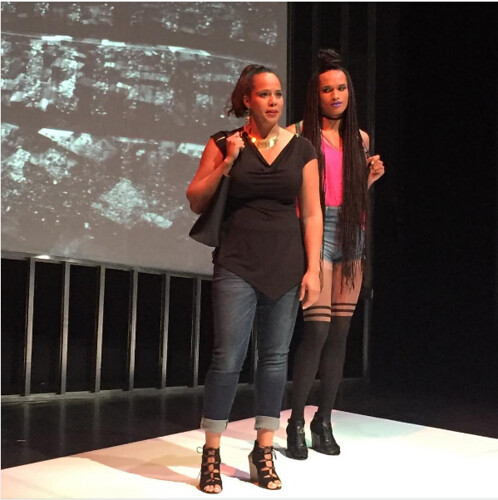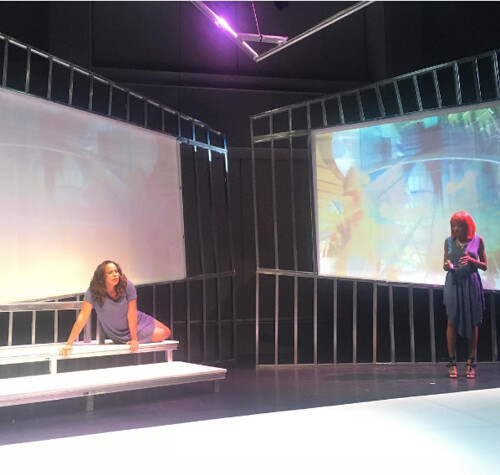Campo goes seriously sci-fi with Hookers on Mars
 Lauren Spencer (left) is Chima and Davia Spain is Fresca in the world premiere of Star Finch's H.O.M.E. (Hookers on Mars Eventually), a Campo Santo production at American Conservatory Theater's The Rueff. Below: Spencer (left) and Jasmine Milan Williams as Apple. Photos courtesy of Campo Santo
Lauren Spencer (left) is Chima and Davia Spain is Fresca in the world premiere of Star Finch's H.O.M.E. (Hookers on Mars Eventually), a Campo Santo production at American Conservatory Theater's The Rueff. Below: Spencer (left) and Jasmine Milan Williams as Apple. Photos courtesy of Campo Santo
What's the last great work of dramatic science fiction you saw on a stage? Maybe you'll have to get back to me on that one. Sci-fi, while stellar (in every sense) in comics, games, books, big screens and small screens, has not generally been a successful theatrical genre. Shakespeare, Eugene O'Neill, Arthur Miller and Tennessee Williams all neglected to set any of their dramas in space, which does seem a shame.
For whatever reason – maybe it's just too much a suspension of disbelief to be in the same roof with actors pretending to be in space, in the future, etc. without feeling a kitschy '70s flashback – sci-fi will likely remain successful outside the theater. But then again there's H.O.M.E. (Hookers on Mars Eventually), a world-premiere play by Star Finch now receiving its world premiere from Campo Santo, a company that has faced some bumps in recent years but is managing to celebrate two decades of producing new plays by – what else? – producing an intriguing new play.
From its title, you might think H.O.M.E. is a sci-fi romp along the lines of Barbarella, and you'd be entirely wrong. San Francisco native Finch is a serious dramatist whose writing has depth, beauty and a muscular poetry to it. Early on in this simply but powerfully staged production, it becomes clear that if Finch wanted to set a play under the sea (and this one partly is), you'd gladly follow her and find a real connection to her story. In other words, she can take the outlandish and make it feel entirely human and lyrical.
Director Sean San Jose works with set designer Tanya Orellana, video artist Joan Osato and lighting designer Alejandro Acosta to create a believably futuristic world without being cheesy about it. A sleek metallic grid holding video screens serves as the streets of Oakland, where main character Chimama Magdalene Union (Lauren Spencer) is putting her life as a prostitute behind her to travel to Mars, where her sister (Britney Frazier as Isla) is raising the son (Micheael Wayne Turner III as Sante) she gave up many years before. We don't have to know what exactly happened to the world that has led us to this point where Google pretty much runs everything on Mars and the United States is systematically auctioning off states to China and Mexico. Believing in a bleak, corporate-controlled future isn't much of a stretch.
The fantastical elements here, from the on-face computer screens worn on Mars to the notion of teleporting humans from below the ocean beyond the Golden Gate Bridge to Mars, are taken at face value as part of everyday life, so even when the story is deeply in the sci-fi realm, there's still a strong human focus.
That comes from Finch's writing as well as from the superb central performance by Spencer as a smart, passionate woman who is in deep contemplation about what it means to be a woman, a mother, a human. Her closest friend is fellow prostitute Fresca (Davia Spain), who has chosen to live life as a woman and with whom she tangles over issues of what defines womanhood. They may fight, but their bond is strong, and that is true of the other characters as well – there's a potent sense of connection, even through the vastness of space.
Isla, who is given ferocity with shades of vulnerability by the stunning Frazier, has done what she needed to do to succeed in life and serve as mother to her nearly 20-year-old nephew, a young man full of questions and passions he doesn't quite understand (and Turner's performance conveys all of this with a poignant ache). She is attempting to bring her sister to Mars so that she can tell Sante the truth of his birth, but all kinds of complications could interfere with that revelation and, Chima hopes, a sort of re-birth for herself and her son.
What the theater can bring to science fiction, and what Finch does so beautifully here, is keep everything on a human scale. When Sante ventures off the proscribed Martian path, he meets a dancer (Jasmine Milan Williams as Apple), and just the fact of their meeting and having an actual conversation beyond the usual screens, is a profound experience. Mortality is also a heavy presence here, and one character wonders if you die on Mars if your soul will still know where to go.
At only about 90 minutes, H.O.M.E. packs a lot into a brief but potent experience that is ultimately less about its science fiction elements (fascinating though they are) and more about its universal human truths.
FOR MORE INFORMATIONStar Finch's H.O.M.E. (Hookers on Mars Eventually) continues through July 10 at American Conservatory Theater's The Rueff in the Strand Theater, 1127 Market St., San Francisco. Tickets are $25. Visit www.brownpapertickets.com for tickets.
